Geochemistry
Dr Heather Handley is an Associate Professor in volcanology and geochemistry at Macquarie.
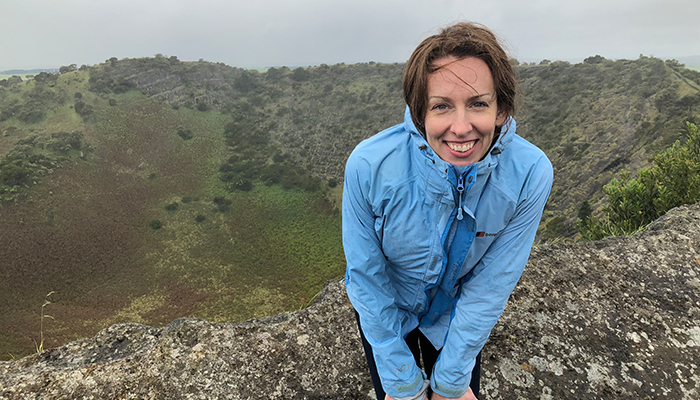
Rock star: Dr Heather Handley is currently studying potential future activity of volcanoes in Australia, and found her calling on a childhood holiday to the Spanish volcanic island of Tenerife.
What sparked your interest in science?
When I was five, my family went caravanning in the UK on the Yorkshire coast, where we went fossil hunting on the beach. It just triggered something in me. I was really fascinated. I still have some of those fossils in my rock collection today. Then a few years later, we went on another holiday to Tenerife, a Spanish volcanic island off North Africa. I saw lava fields and a massive volcano — that just ignited my interest in volcanoes.
As a volcanologist, what are you currently studying?
I am looking at volcanoes that have erupted either recently or in the past. If I'm lucky enough to find a quarry, a road cutting or a river, I can see a sequence of all the layers that represents the history of the eruptions. Then I take samples which I date by the crystals in the deposits, to see how explosive they are.
I take my daughters to the beach and we collect pumice - they know its volcanic rock with holes in it. We do a little experiments and see that it floats.
Australia still has two potentially active areas: in Victoria through to South Australia and in Northeast Queensland, where we may see another eruption in the future. My research is trying to work out how much warning time might we get associated with a future activity.
How do your children experience science and how can other parents do it?
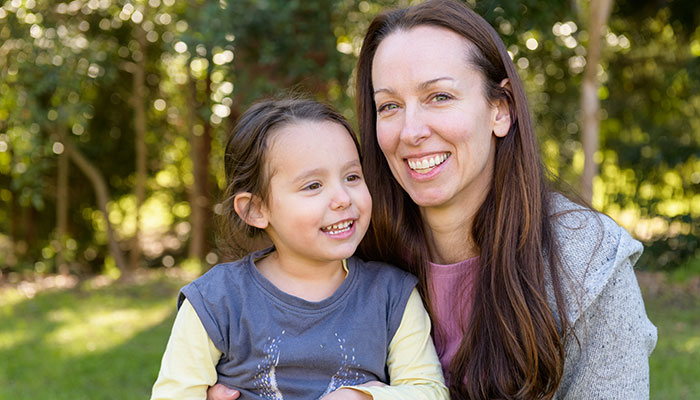
Seaside explorers: Dr Handley takes her daughters Sienna and Isabelle (pictured) to the beach to collect pumice and contemplate from how far away it may have come.
I raise their awareness about how natural things are formed in the environment. I take my daughters Sienna (6) and Isabelle (3) to the beach and we collect pumice. It's usually a grey colour with holes in it. And they know it's a volcanic rock but then I ask them: 'where does it come from if there are no erupting volcanoes in Australia?' Then we do a little experiment and see that it floats and think 'Wow, maybe it came from an eruption in Tonga or Vanuatu and floated all the way here.' They find that very exciting.
Our Department is involved in Sydney Science Trails, aimed at primary-aged students, and we have created a Science Week event called Rock Detectives which includes a series of videos and resources for teachers.
Marine Biology
Professor Culum Brown is a marine biologist who heads the Fish Lab at Macquarie University.
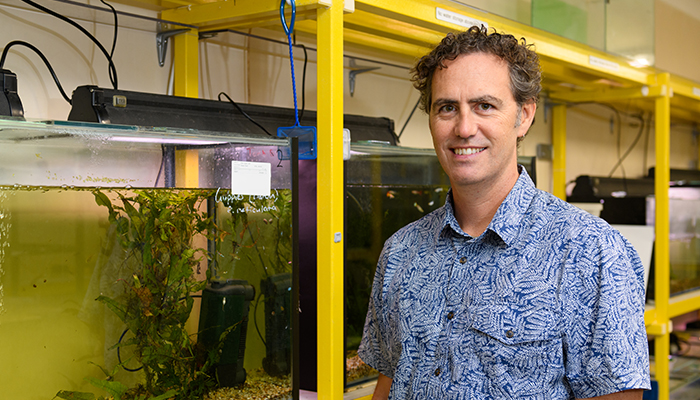
Under the sea: Professor Culum Brown was a keen snorkeller from an early age and now takes his own children on coastal fields trips where they have developed a similar appreciation for marine life.
What got you interested in science?
My parents were not remotely sciency, but my mother encouraged my love of animals by buying me field guides. When I was with my father in South East Asia, we frequently went snorkelling on amazing coral reefs.
Can you give an insight into the issues you are working on?
Since my research has revealed that fish have intelligence, personalities and social networks and feel pain, I do a lot of outreach communication work, talking to community groups and schools, and also do media interviews. I work with animal welfare groups and government agencies, developing guidelines on fish welfare and ethics for fishing and aquaculture. I supervise a lot of post-grad students in Australia and around the world, particularly studying sharks and rays.
How have you hooked your own children on science?
My oldest, Maia (10) is super keen on snorkelling. Orlando (7) loves sharks and is always doing something sharky for his school assignments. Nicolo (5) loves bugs, grasshoppers, caterpillars and anything else he can catch.
The kids have all spent time in the field with me while working on sharks ... they love science as much as I do.
They are naturally inquisitive. I encourage them to learn the names of the birds they see around the yard and identify their calls — the same with frogs using the Frog ID app. They play with insects by catching them and making them 'homes'. This gets them to find out a little about their habitat and what they eat. Anyone could try this at home. We also have a huge fish tank.
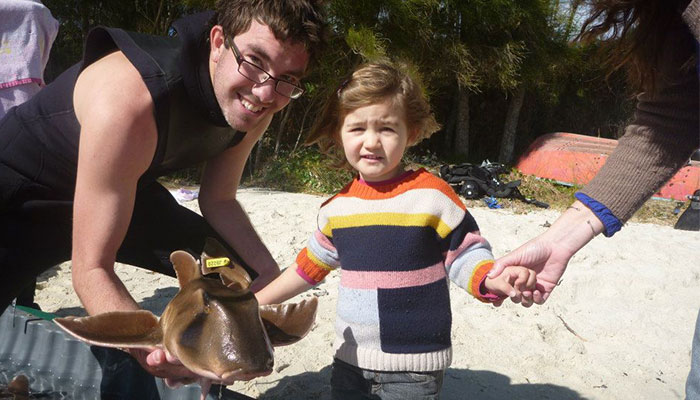
Never too young: At age two, Maia Brown accompanied her father Culum Brown on a shark research field trip - she is pictured here with PhD student at the time Nathan Bass. (Maia is now 10).
A few years ago, they collected snails from the garden and 'tagged' them using different colours of nail polish. They'd seen me tagging fish and got the idea to tag snails. Each snail had a name and they watched those snails move around the garden for nearly a year. The kids have all spent time either in the field with me while working on sharks, or have visited the same locations on holidays. They love sharks as much as I do.
Astrophysics
Dr Ángel López-Sánchez is an astronomer and astrophysicist at Australian Astronomical Optics and senior lecturer at Macquarie.
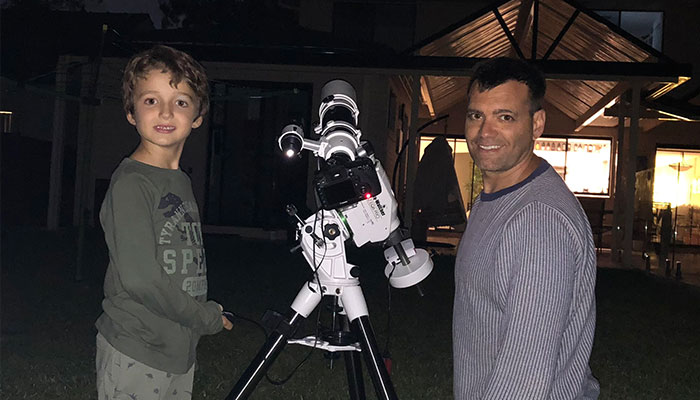
Like father like son: seven year-old Luke seen here observing the night sky with father Angel Lopez-Sanchez, also draws the planets and enjoys basic physics and chemistry.
When did you get interested in science?
I am a native scientist – it's something I've done all my life. I remember in Spain when I was about three years old and I was going with my mum out on the terrace at night, to get the clothes in from the line. She told me about the stars and planets and satellites. I was just so excited!
We have several white boards around the hosue and we draw the solar system and the planets, as well as doing plenty of maths and basic physics and chemistry.
By the time I was four, I wanted everybody to buy me books on astronomy. When I was 10, I used my dad's standard 7x50 binoculars and I could identify all the constellations, the satellites around Jupiter and even nebulas. The summer I turned 12, my dad bought me my first telescope and it was probably the best gift I ever received in my life.
What are you currently studying?
I am a bit of a weird astronomer because I combine observations from both optical telescopes, like the Anglo-Australian Telescope, and radio telescopes, like the Australia Telescope Compact Array. I analyse this data and compare it against models to better understand how the gas condenses to form stars in galaxies and how this affects the evolution of galaxies.
How have you engaged your son in science?
My seven year-old son Luke has been interested in astronomy since he was about three. He's helped me with a lot of projects - like photographing all the phases of the moon. ABC even used some of our photos for a special on the 50th anniversary of the moon landing. We have several whiteboards around the house and together, we draw the solar system and the planets, as well as doing plenty of maths and basic physics and chemistry.
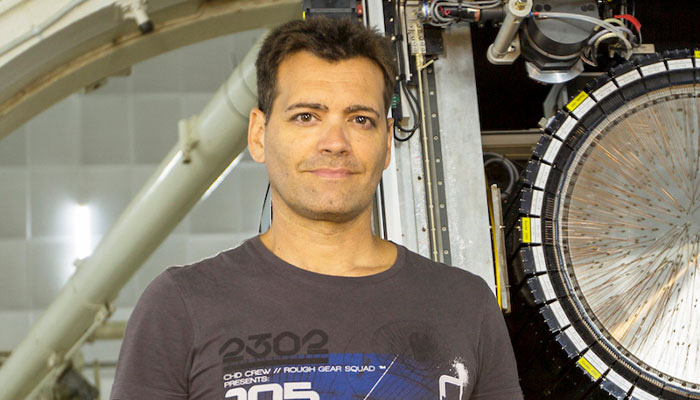
Lifelong passion: By the time he was four, Angel Lopez-Sanchez wanted everybody to buy him books on astronomy.
How can other parents get their children to see planets at home?
It's not that expensive to get some binoculars. You can get some for even $100. A tripod keeps them stable and you can use both eyes to observe. You can see all the planets, including Neptune and Uranus, the moons of Jupiter, and even bright star clusters, nebulae and galaxies.
The best Apps to help you are SkyMaps, Stellarium and SkySafari.
On now: National Science Week 14-22 August 2021
This story was first published on August 17, 2020.






